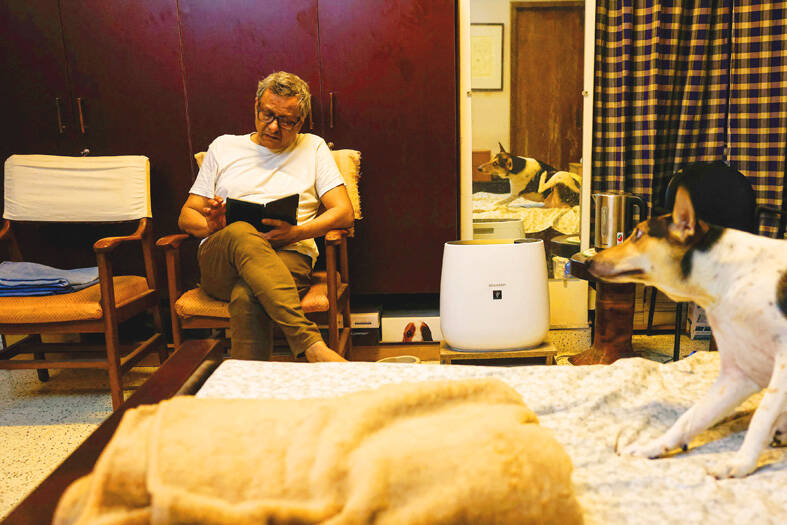A new analysis found that last year, only 10 countries and 9 percent of global cities had air quality that met WHO guidelines for harmful fine-particle, or PM2.5, pollution.
Some of the places most affected were in the Middle East, Africa, and central and south Asia. Bangladesh, Pakistan, India, Tajikistan and Burkina Faso ranked as the five countries with the most polluted air last year, weighted by population, said a report by IQAir, a Swiss air quality technology company that collects air-sensor data around the world.
The capital cities with the worst air were New Delhi, Dhaka, Ouagadougou, Dushanbe and Baghdad, IQAir found.

Photo: Reuters
Capitals with the lowest concentrations of PM2.5 were mostly in Oceania, Scandinavia and the Caribbean, and included Wellington, Reykjavik and Hamilton.
One of the most common forms of air pollution, PM2.5 “kills more people than any other pollutant that is out there,” said Glory Dolphin Hammes, CEO of the North American division of IQAir, which has released annual World Air Quality reports since 2017.
Sources of PM2.5 pollution vary widely, from brick kilns in Bangladesh to mining in Latin America. However, the overwhelming source is the burning of fossil fuels such as coal, oil and gas.
Outdoor air pollution, caused primarily by PM2.5, is responsible for the early deaths of more than 4 million people worldwide each year, the WHO has said.
A separate analysis led by a researcher at the Max Planck Institute for Chemistry in Germany found that fossil fuels are responsible for 65 percent of those deaths.
“The first thing to understand about PM2.5 is it’s a very complex mixture of gases and particles that are suspended in the air, and it’s defined by size,” said Misbath Daouda, an assistant professor of health equity and environmental justice at the University of California at Berkeley who was not involved in IQAir’s analysis.
The particles are “small enough that they can enter different organ systems and the bloodstream; they can irritate the lungs and the respiratory system. And that’s what makes them so detrimental for health,” Daouda said.
PM2.5 pollution is linked to increased rates of heart attack and stroke, and can cause what is known as oxidative stress — essentially, stress that damages the body’s cells faster than they can repair themselves.
Oxidative stress is associated with a variety of illnesses ranging from Parkinson’s disease to cancer.
More recent research have shown that exposure to PM2.5 can also affect brain development, “so that’s a concern for young children,” Daouda said.

‘TAIWAN-FRIENDLY’: The last time the Web site fact sheet removed the lines on the US not supporting Taiwanese independence was during the Biden administration in 2022 The US Department of State has removed a statement on its Web site that it does not support Taiwanese independence, among changes that the Taiwanese government praised yesterday as supporting Taiwan. The Taiwan-US relations fact sheet, produced by the department’s Bureau of East Asian and Pacific Affairs, previously stated that the US opposes “any unilateral changes to the status quo from either side; we do not support Taiwan independence; and we expect cross-strait differences to be resolved by peaceful means.” In the updated version published on Thursday, the line stating that the US does not support Taiwanese independence had been removed. The updated

‘CORRECT IDENTIFICATION’: Beginning in May, Taiwanese married to Japanese can register their home country as Taiwan in their spouse’s family record, ‘Nikkei Asia’ said The government yesterday thanked Japan for revising rules that would allow Taiwanese nationals married to Japanese citizens to list their home country as “Taiwan” in the official family record database. At present, Taiwanese have to select “China.” Minister of Foreign Affairs Lin Chia-lung (林佳龍) said the new rule, set to be implemented in May, would now “correctly” identify Taiwanese in Japan and help protect their rights, the Ministry of Foreign Affairs said in a statement. The statement was released after Nikkei Asia reported the new policy earlier yesterday. The name and nationality of a non-Japanese person marrying a Japanese national is added to the

AT RISK: The council reiterated that people should seriously consider the necessity of visiting China, after Beijing passed 22 guidelines to punish ‘die-hard’ separatists The Mainland Affairs Council (MAC) has since Jan. 1 last year received 65 petitions regarding Taiwanese who were interrogated or detained in China, MAC Minister Chiu Chui-cheng (邱垂正) said yesterday. Fifty-two either went missing or had their personal freedoms restricted, with some put in criminal detention, while 13 were interrogated and temporarily detained, he said in a radio interview. On June 21 last year, China announced 22 guidelines to punish “die-hard Taiwanese independence separatists,” allowing Chinese courts to try people in absentia. The guidelines are uncivilized and inhumane, allowing Beijing to seize assets and issue the death penalty, with no regard for potential

‘UNITED FRONT’ FRONTS: Barring contact with Huaqiao and Jinan universities is needed to stop China targeting Taiwanese students, the education minister said Taiwan has blacklisted two Chinese universities from conducting academic exchange programs in the nation after reports that the institutes are arms of Beijing’s United Front Work Department, Minister of Education Cheng Ying-yao (鄭英耀) said in an exclusive interview with the Chinese-language Liberty Times (the Taipei Times’ sister paper) published yesterday. China’s Huaqiao University in Xiamen and Quanzhou, as well as Jinan University in Guangzhou, which have 600 and 1,500 Taiwanese on their rolls respectively, are under direct control of the Chinese government’s political warfare branch, Cheng said, citing reports by national security officials. A comprehensive ban on Taiwanese institutions collaborating or